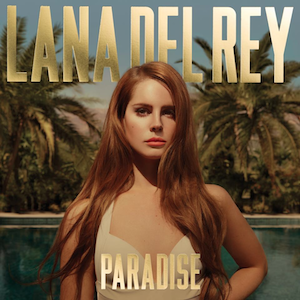Some Notes Toward A Review Of Lana Del Rey’s Paradise EP
1. “I hear America singing, the varied carols I hear—” (Whitman)
2. Eleven months later: a year populated with evasive identities (Dean Blunt/Inga Copeland) and split personalities (Dominick Fernow) and aural plastic surgeries (vaporwave). A year that drains questions regarding authenticity — of the biography, the body, the song, the voice — of all their apparent critical content. A year that lets the critics wrestle around in the puddle.
3. Eleven months later: I’ve clicked on every link bearing the name Lana Del Rey that I’ve come across. I’ve watched every video, read every article, listened to every song. I’ve wanted to understand who she is — that is, who she is for us. On the gossip blogs, she is mocked. On Tumblr, she is fetishized. On the music blogs, she’s written about with optimistic ambivalence, by critics who aren’t sure whose ass they should be kissing. It’s all very confusing to me, and I don’t want to participate in any of it: the mockery, the fetishization, or the murky in between. I’m interested in other questions.
3.5. Like,
4. I wonder if Lana Del Rey would’ve been better received in a time of economic prosperity.
5. In 1937, in the midst of recession, Napoleon Hill’s Think and Grow Rich was published. In it were the secrets of the success of American industrialists: that is, desire and imagination, will and drive, the materiality of “prayer,” the patriarchal “mysticism” of sex, and, finally, self-restraint. It was filled with the kind of self-serving pop-psychology that continues to darken the pages of throwaway self-help books business people read in transit. It was filled with the impoverished theology that continues to turn the Sermon on the Mount on its head in prosperity churches all across America. From one sale to the next. Napoleon Hill wrote: “You are the master of your destiny. You can influence, direct and control your own environment. You can make your life what you want it to be.” Hill also wrote: “If you do not see great riches in your imagination, you will never see them in your bank balance.” And: “Our only limitations are those we set up in our own minds.”
6. “I think everyone should have the book Think and Grow Rich by Napoleon Hill.” (Lana Del Rey; 2010)
6.5. Q: What book inspires you the most?
A: “I think, um, Think and Grow Rich by Napoleon Hill.” [my transcript]
(Lana Del Rey; January, 2012)
6.5.5. Lana Del Rey sings, “Everything I want I have: money, notoriety, and Rivieras,” before she has any on her own accord.
7. MIC CHECK! (mic check!) LET US NOT FORGET (let us not forget) THAT OTHER VOICE (that other voice) THAT LOUDER VOICE (that louder voice) THAT SONG (that song) THAT CARRIED US (that carried us) TO ZUCCOTTI PARK (…) TO LIBERTY PLAZA (…) TO DEMAND (…) THE END (…)
8. While Lana Del Rey pushed one narrative (of the self-made woman, the auteur, etc.), the blogs pushed another (her father’s wealth, Lana Del Rey™ as Interscope’s new brand, etc.). Let’s be honest: she never stood a chance last time.
9. That, coupled with Born to Die’s valorization of wealth, its old-money nostalgia, its new-money flaunting, its crass symbolism, its American mythologies, its selfishness…
10. It was an album populated with rich, bored Americans. It was an apology for her father. It still believed in the legitimacy of the “American dream.” It would’ve had college paid for. It already had boarding school paid for. It drove the “right cars” and wore the “right clothes” and drank the “right alcohol.” It could buy all the access it ever needed. It did. It was an album for the 1%.
11. It’s as simple as the fact that she, who has had everything handed to her, has tattooed, on her hand, the phrase “trust no one.” That is, it would’ve never slept in a park in any city, never resisted anything — even fashionably.
12. But there is that other side, too. There is the loneliness of Lana Del Rey, which I explored at length in my review of Born to Die. That side which knows no political affiliation, nor economic status, nor celebrity. It is a devastatingly human condition, and I can’t help but fall back on the passage that echoed in my mind, like a refrain, as I composed my index of Born to Die: “I don’t want to be alone.”
12.5. A different kind of wishful thinking.
13. That isn’t the sentiment of someone who believes, for a moment, that they will be remembered — for anything.
14. That isn’t the sentiment of someone who finds value in their status, or in their person.
15. Considering who she could’ve been in 2012, am I the only one who finds it genuinely pitiful that her most memorable photo-op was with Barry Manilow and Marilyn Manson? Or that her celebrity fling was with Axl Rose? Or that her celebrity feud was with Courtney Love?
16. Which brings me, finally, to Paradise, which is the best attempt (yet) to cohere a deeply incoherent artist.
17. A deeper, consistent, and often flattering vocal range.
18. A refined, consistent vision: Julee Cruise meets Marilyn Monroe.
19. A stronger series of symbols and lyrical tropes; a confident vision of self-loathing and power dynamics; a very tenuous second chance.
20. A proper re-release: Born to Die: Paradise Edition. Post-election. A deeply incoherent country, resting as it rests, at last. Holiday season. Black Friday sales. A “stronger economy.” Consumer confidence indexes. A series of parks, emptied by police. New commercial prospects: H&M, Jaguar. People still sleeping in gutters, under bridges, in boxes. Debts unpaid. The power of positive thinking. New possibilities for the artist who has never quite been a part of her time or place or self. Another tattoo: Paradise.
21. Napoleon Hill wrote: “Most great people have attained their greatest success just one step beyond their greatest failure.”
22: Lana Del Rey sings, “Whitman is my daddy.” Whitman responds, “[she] most honors my style who learns under it to destroy the teacher.”
23. Whitman meets Napoleon Hill. A confluence. A song of myself.
24. Investment banker, I hear your song; Super PAC, I hear your song; real housewife, I hear your song; drones, I hear your song; middle manager, I hear your song; Tea Partier, I hear your song; trust fund, I hear your song; new, creative industrialist, I hear your song.
25. “Each singing what belongs to him or her and to none else…” (Whitman)
CODA
from Jasmine Dreame Wagner:
Ways in which [Lana Del Rey] and Whitman are similar.
1. Works by both were universally panned by their critics and contemporaries.
2. Both earned income by crafting sentimental bits of space-filler for empty spots in publications.
3. Preparing for death, both built massive mausoleums and visited daily during construction.
4. Both are known to have said, “The proof of a famous person is that, like, his country absorbs him as affectionately as he has absorbed it.”
5. Both are known to have said, “I suffer all the time: I have no relief, no escape: it is monotony — monotony — monotony — in pain.”
More about: Lana Del Rey




